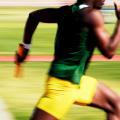
This activity investigates the importance of accurate measurement in competitive sport, and is aimed at secondary maths students (Key Stage 4).
Speed and accuracy
Accurate measurement of times and distances is very important in the Olympic Games. Races have been won by as little as a thousandth of a second. You are going to investigate some small things that might have an important influence on who wins a Gold medal. As is often the case when mathematicians use mathematics to understand the world, we need only very simple calculations but we have to search out some of the pieces of information that we need and be able to make a simple estimate of the answer in order to get a good idea about whether it is worth doing a more detailed calculation.
Running in lanes
Some years ago many world records were spectacularly broken by Chinese women athletes in their national championships in China. None of the time records were ever approached again by the athletes concerned (or by any one else). Suppose that the track being used was short, so that the distance around a lap was not 400 metres, but 400 x L metres, where L is less than or equal to 1 is a factor that measures how short the track was (so if L = 1, the track is the correct length).
Show that for any event run around the track (eg. world records were set at 1500m, 3000m, and 10000m) that the time recorded, T(short), on the short track should be corrected to
How could you use this result to figure out the effect of running the whole of a race in the second lane?
First at the finish
Times can be measured to the nearest 0.001 of a second. Bearing this in mind:
- How close together are 100 metre runners when running at about world record pace? Do you think the thickness of their vests matters? (The person whose chest crosses the finishing tape first wins).
- In the shortest swimming races (50 metres) would it help to grow your finger nails? (The person whose fingers touch the end of the pool first wins).
- How accurate does the rectangular shape of the swimming pool have to be in order to avoid biasing races?
- What advantage is gained by being 2 metres tall, rather than 1.85 metres tall in the 50 metres swimming race?
Starting
The world record for the men's 100 metres is (currently) 9.58 seconds and times are given to the nearest 0.01 of a second -- although the photofinish can separate athletes who finish separated by less than 0.01 of a second. An Olympic finalist will need to run 10.00 seconds and this is a handy benchmark time to use in calculations about typical sprinters.
Suppose that at the start of a 100m race the starter, armed with a starting pistol, stands on the in-field area 5 metres away from the runner in lane 1 and 15 metres away from the runner in lane 8 when s/he fires the starting pistol. If the speed of sound is 344 metres per second and the runner in lane 1 finishes 1st, just 0.01 sec ahead of the runner in lane 8, should the runner in lane 8 feel unhappy?
These were originally developed by our Motivate project as follow-up activities to a talk by Professor John D Barrow FRS on 'The Maths Behind the Olympic Games'.

